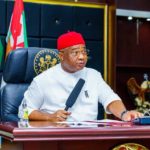The retrogression of Nigeria did not start in 2015; it started since 1914 when the incompatible entities of the Southern and Northern Protectorates were unfortunately merged for effective administration by the colonialists. It is important to note here that this merger was not done for the good of the people of these regions but to reduce the cost and personnel needed to run the conglomerate and maximise their exploitation agenda.
The exposure of Nigerians to poor quality education is historical. It dates back to the colonial era when blacks were not deemed fit to have equal education with their white counterparts. They were exposed to substandard education and poor leadership training. Thus, the majority of those who led the struggle for self governance were not holistic in their plans. They agitated to replace the colonialists in the management of their country’s affairs without the blueprints of how they intended to run the country to be bequeathed onto them.
Unfortunately for them, the British government barely prepared them for leadership roles. The Nigerian educated elites were not allowed to contribute directly in the affairs of their country. Thus, upon the granting of independence, the Nigerian independence fighters were unprepared to govern. They were short of the expertise to run a vast and diverse entity bequeathed onto them.
Before independence, it was evident that national interest was not a top agendum of the independence struggle. The earlier call for independence was rejected by a group among the nationalists. Shortly after independence, ethnic politics became widely pronounced with each former protectorate canvassing for its interests. In less than six years of independence, military took over power from the divided nationalists. This was to become a recurrent phenomenon in the political history of Nigeria till the Fourth Republic.
From the foregoing, it can be deduced that the impatient trait in Nigerians is hereditary. The reasons for this are not far from the poorly structured inherited education system and poor leadership training Nigerians were exposed to. The development of Nigeria is delayed by the large ignorance of many Nigerians which birth their historic impatient nature. Nigeria is too vast and diverse to be run as a centralised country. If Nigeria must develop, she must give her federating units some reasonable amount of power to act independently. It must be decentralised. This is what is known as restructuring in some quarters.
Qudus Adewale Lawal, Lagos.






